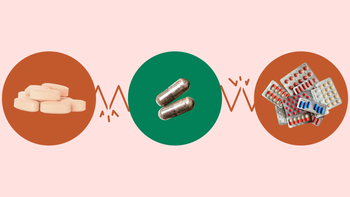
Trying to Increase Serotonin Naturally? Supplements, Foods, and Habits That Can Help
Key takeaways:
If you want to increase your serotonin levels naturally, start with sunlight, food, meditation, and exercise. And consider supplements as a secondary line of defense.
There are also some supplements that may help increase serotonin and improve mood. But given the potential for side effects or medication interactions, it’s best to use these with caution.
While there are several natural options to boost serotonin, these may not be enough for everyone. Some people need prescription medications to help with conditions like depression.

Serotonin is a chemical messenger in the brain that’s strongly connected to mood. How much — or how little — your body produces is also connected to the risk for conditions like anxiety, depression, and seasonal affective disorder (SAD). And while genetics play a role in mental health, it’s not the only factor. Studies have found that different diet and lifestyle factors can play a role in serotonin levels and mood, too.
What are the signs of low serotonin levels?
Since serotonin is so closely related to mood, signs of low serotonin are often similar to symptoms of depression and anxiety. They can include, but are not limited to:
Mood changes
Feelings of hopelessness or emptiness
Low energy and fatigue
Changes in appetite (increase or decrease)
Changes in sleep patterns (sleeping more, sleeping less, or disrupted sleep)
Increased worry or concern about the present or future
Increased dwelling on the past or present
Search and compare options
The precise cause of low serotonin remains unclear. However, considering what experts know about boosting levels, it likely has several different causes. Nutrition, physical activity, sunlight, and genetics all play a role in your natural serotonin level.
Natural ways to boost your serotonin
If you experience any of the symptoms mentioned above, there are many different ways you can boost the feel-good hormone through diet and lifestyle changes. While some recommendations may look simple and familiar, these are a good place to start if you’re looking to improve mood.
Exercise
Regular physical activity has several positive effects on serotonin and other mood-boosting hormones (like dopamine). Getting 150 minutes of physical activity per week could help support better mental health, mood, and reduce many of the symptoms associated with low serotonin.
Sunlight
If you notice changes in your mood from summer to winter, you’re not alone. Less time in the sun is associated with an increased risk for depression. This is thought to be linked to the sun’s effect on how our body processes serotonin. Between 5 and 30 minutes of daily sun exposure can help ward off any seasonal blues, and improve mood all year long.
Meditation
One small study found that serotonin levels were higher in those who frequently meditated, in comparison to those who didn’t. The study also noted an increase in melatonin levels, the hormone that helps with sleep. Practicing mindfulness meditations can help reduce stress. It can also help improve things like memory, attention span, and focus.
Do serotonin supplements work?
The following supplements have been studied for their effect on serotonin and mood more than others. It’s important to remember that if you take supplements, they work best when used alongside a healthy diet and lifestyle. On their own, they cannot replace the benefits of physical, mental, and nutritional self-care.
Read more like this
Explore these related articles, suggested for readers like you.
5 HTP
5-HTP is a direct precursor to serotonin. This means it’s a molecule that the body uses to make serotonin. So it makes sense that a supplement may help increase serotonin levels. However, the research is still limited on whether 5-HTP makes a difference in the body’s production of serotonin.
One study compared 5-HTP with an antidepressant medication. They found a similar impact on depression scores. Another small study found 5-HTP to be effective for improving anxiety. While more research is needed on 5-HTP as a supplement, this initial research is promising for those looking to improve mood.
St. John’s wort
St. John’s wort is a popular supplement for mental health. And a handful of studies suggest St. John’s wort can help with symptoms of depression. Though it’s not clear how St. John’s wort improves these symptoms, some research suggests it works in a similar manner to selective serotonin reuptake inhibitors (SSRIs). These are medications that help your body use serotonin better.
A review of 14 different studies found that St. John’s wort reduced symptoms of depression. They also found that St. John’s wort had fewer side effects than traditional medications like SSRIs. Another study found it to improve depression over placebo.
But it may not be the best choice for people who take other medications. This is because it has several medication interactions, including:
Oral contraceptive pills
Anticoagulant medications like warfarin
Medications for reducing stomach acid
Cholesterol-lowering medications
Immune system suppressants
St. John’s wort can interact with medications in a number of different ways. It can reduce the effectiveness of some medications, so they don't work as well. For other medications, it can do the opposite. It can increase the risk of toxicity — particularly with medications that are also designed to increase serotonin (like antidepressants.) So it’s important to use caution with St. John’s wort, and ask your healthcare provider or pharmacist about any potential interactions before you try it.
Ashwagandha
Ashwagandha is in a category of supplements called adaptogens. These are herbs that are reported to help the body manage stress.
Some studies suggest ashwagandha may help increase serotonin levels, thus improving symptoms of stress and anxiety. Other research suggests ashwagandha can reduce stress by reducing cortisol, a stress hormone.
Ashwagandha appears to be safer than some herbs, like St. John’s wort. Although in general, herbal supplements have more potential for medication interactions. Ashwagandha may interact with certain medications for diabetes, blood pressure, thyroid, immune system, and seizures. And is found to be safest when taken in the short term.
Even though it’s unclear how ashwagandha affects serotonin directly, research is promising that it may improve overall mood and well-being. And the existing research hasn’t yet found any serious health risks.
Omega-3 fatty acids
There’s limited evidence on how omega-3 fatty acids affect serotonin. But there’s some research to suggest it can help with mood.
One observational study in people with depression compared omega-3 supplements to antidepressants. They found that taking a combination of the two had the largest impact on depressive symptoms. This may be related to the way omega-3s lower inflammation in the body, which can help chemicals like serotonin do their job.
If you’re thinking about taking an omega-3 supplement, they’re most often found in fish oil supplements. And they have relatively few side effects, especially compared with herbal supplements. So it’s relatively safe to take them, whether you take any other medications for serotonin levels.
Vitamin D
Since exposure to sunlight increases vitamin D levels, it makes sense that vitamin D may help with serotonin and mood. But studies are mixed on how taking a vitamin D supplement affects mood.
One study found no significant changes to serotonin (or cortisol) when people took a vitamin D supplement. However, another review highlighted the importance of vitamin D in the diet for healthy serotonin levels. Researchers noted that getting enough vitamin D increased an enzyme called TPH2, which is essential for creating more serotonin in the brain.
But it’s important to get enough vitamin D for reasons beyond serotonin. It’s an important vitamin for many different body processes. But more than half of the world’s population is deficient in vitamin D.
The next time you see your healthcare provider, it might be worth asking to get your levels checked. In the meantime, it won’t hurt to add some foods rich in vitamin D to your diet, like:
Fortified drinks (including orange juice, milk, and plant-based milks)
Fatty fish (including salmon, trout, and tuna)
Fortified breakfast cereals
Eggs
Tofu
When it comes to supplements, studies suggest most healthy adults can take between 1,000 IUs and 4,000 IUs of vitamin D safely.
Probiotics
Probiotics help promote healthy gut bacteria. And this can provide several health benefits beyond just the gut.
There are no good studies in humans that look at probiotics and serotonin. But one review found that probiotics positively affected serotonin levels in rats. Though rat studies don’t always indicate the same results in humans, it shows some potential. And since probiotics are safe for most people, it won't hurt to give this one a try if you’re interested. Just note that people with weakened immune systems should check with their healthcare provider first.
Can tryptophan foods increase your serotonin levels?
Tryptophan is an amino acid that plays an important role in serotonin production. Your body cannot create its own tryptophan, so you need it from your diet to support serotonin levels.
Tryptophan is highest in animal proteins. But it can be found in plant-based foods, too. Dietary sources of tryptophan include:
Poultry, like turkey and chicken
Meat, such as beef, lamb, and pork
Fatty fish, such as salmon and tuna
Oats
Dairy like milk and cheese
Nuts and seeds
Legumes
In addition to tryptophan, you also need vitamin B6 to make serotonin. Your body actually uses B6 to convert tryptophan into serotonin. Pairing complex carbohydrates, which are rich in B vitamins, with high tryptophan foods can increase serotonin production, thus improving mood.
Good sources of vitamin B6 include:
Chickpeas
Tuna
Salmon
Chicken
Ground beef
Turkey
Fortified breakfast cereals
Potatoes
Bananas
The bottom line
Your serotonin levels are affected by a lot of things. And some of them — like your genetics — are outside your control. But not all of them. To increase your serotonin, make sure you’re getting enough physical movement and sunlight in your day. Research suggests this may be particularly helpful for people who have mild to moderate depression. While natural remedies may not replace medications for depression, they may support a well-rounded treatment plan. Together, you and your healthcare provider can figure out the best options for you.
Why trust our experts?


References
American Psychological Association. (2020). Working out boosts brain health.
Benitez, J. S. C., et al. (2022). Advantages and disadvantages of using St. John's wort as a treatment for depression. Cureus.
Bleizgys, A. (2021). Vitamin D dosing: Basic principles and a brief algorithm (2021 update). Nutrients.
Blier, P., et al. (2013). Serotonin and beyond: Therapeutics for major depression. Philosophical Transactions of the Royal Society B.
Examine. (2023). Ashwagandha.
Hansen, A. L., et al. (2020). Vitamin D supplementation during winter: Effects on stress resilience in a randomized control trial. Nutrients.
Huiberts, L. M., et al. (2021). Effects of vitamin D on mood and sleep in the healthy population: Interpretations from the serotonergic pathway. Sleep Medicine Reviews.
Jangid, P., et al. (2013). Comparative study of efficacy of l-5-hydroxytryptophan and fluoxetine in patients presenting with first depressive episode. Asian Journal of Psychiatry.
Kennedy, D. O., et al. (2016). B vitamins and the brain: Mechanisms, dose and efficacy—a review. Nutrients.
Khan, R. S., et al. (1985). L-5-hydroxytryptophan in the treatment of anxiety disorders. Journal of Affective Disorders.
Lopresti, A. L., et al. (2019). An investigation into the stress-relieving and pharmacological actions of an ashwagandha (Withania somnifera) extract. Medicine.
Majeed, M., et al. (2023). A standardized ashwagandha root extract alleviates stress, anxiety, and improves quality of life in healthy adults by modulating stress hormones: Results from a randomized, double-blind, placebo-controlled study. Medicine.
Mehdi, S., et al. (2023). Omega-3 fatty acids supplementation in the treatment of depression: An observational study. Journal of Personalized Medicine.
Mohajeri, M. H., et al. (2015). Chronic treatment with a tryptophan-rich protein hydrolysate improves emotional processing, mental energy levels and reaction time in middle-aged women. British Journal of Nutrition.
Nair, R., et al. (2012). Vitamin D: The “sunshine” vitamin. Journal of Pharmacology and Pharmacotherapies.
National Center for Complementary and Integrative Health. (2017). St. John's wort and depression: In depth. U.S. Department of Health and Human Services.
National Center for Complementary and Integrative Health. (2023). Ashwagandha. U.S. Department of Health and Human Services.
National Institute of Mental health. (2023). Depression.
Peterson, B., et al. (2023). St. John’s wort. StatPearls.
Richard, D. M., et al. (2009). L-Tryptophan: Basic metabolic functions, behavioral research and therapeutic indications. International Journal of Tryptophan Research.
Sansone, R. A., et al. (2013). Sunshine, serotonin, and skin: A partial explanation for seasonal patterns in psychopathology? Innovations in Clinical Neuroscience.
Thambyrajah, J. C., et al. (2023). Serum melatonin and serotonin levels in long-term skilled meditators. Explore.
Wallace, C. J. K., et al. (2017). The effects of probiotics on depressive symptoms in humans: A systematic review. Annals of General Psychiatry.
Zhao, X., et al. (2023). The efficacy and safety of St. John's wort extract in depression therapy compared to SSRIs in adults: A meta-analysis of randomized clinical trials. Advances in Clinical and Experimental Medicine.
Zhou, L., et al. (2022). Possible antidepressant mechanisms of omega-3 polyunsaturated fatty acids acting on the central nervous system. Frontiers in Psychiatry.
Zuraikat, F. M., et al. (2022). Sleep and diet: Mounting evidence of a cyclical relationship. Annual Review of Nutrition.





























